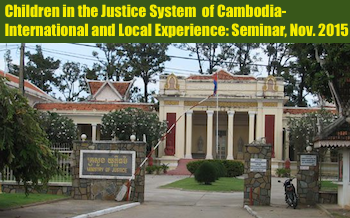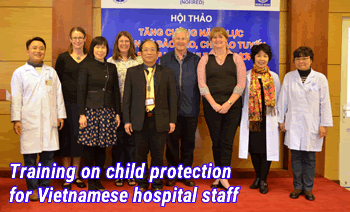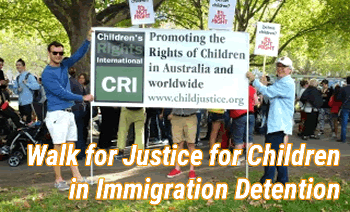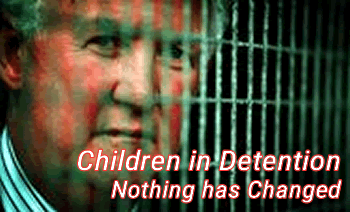Children’s Rights International Initiative: Child Protection and Child Justice in Vietnam
In November 2009 the Chair of CRI, the Hon Alastair Nicholson, joined a group from the Royal Children’s Hospital, Melbourne visiting Vietnam to examine the issue of child protection and child justice in that country. This involved a visit to the National Paediatric Hospital in Hanoi and attendance at a medical seminar there on the detection of child abuse conducted by Dr Anne Smith of the Royal Children’s Hospital and Professor David Wells of the Victorian Institute of Forensic Medicine.
He also participated as a co-chair in the first Vietnamese national seminar to be held on the subject of child abuse and child protection.
This intensive seminar involved a number of senior Government officials from various Government Departments and representatives of various NGO’s. The proceedings were opened by Dr Nguyen Duy Khe, the Director of Maternal and Child Health at the Ministry of Health.
The primary presentations were made by Professor Michael Dunne of Queensland University of Technology (QUT) who discussed international and Vietnamese data on child abuse. His main thesis was that indicia of international child abuse are showing substantial falls in most countries. He was supported by Dr Nguyen Thanh Huong who described the limitations of current Vietnamese data, mainly in relation to adolescents. Dr Anne Smith and Professor David Wells discussed what programs had been found to be most effective in reducing child abuse.
The seminar also benefited from an address given by Dr Nguen Trong An, another co-chair and the Vice Head of The Department of Child Care and Protection, of the Ministry of Labour, War Invalids and Social Affairs (MOLISA). His general theme was that child abuse was an increasing and urgent problem that required immediate and concerted action by all responsible persons. He quoted a number of statistics to support his argument and indicated that he favoured specialist courts to deal with the problem, including a family court. Interestingly enough he explained that it was unlawful to physically chastise children in Vietnam.
There followed a series of other addresses including one from Mr Bui Sy Loi, the Vice Head of the Parliamentary Committee for Social Affairs, who supported Dr An in principle as to the need for urgent action.
Colonel Nguyen Tri Viet, the deputy Director of the Department for Social and Public Order Crimes, Ministry of Public Securities, expressed the view that the solution lay in detection of abuse and heavy penalties where it was found to occur.
The Women’s Union and other NGO speakers, (who included representatives of Save the Children and UNICEF), were largely united on the need for social workers, specialist police and specialist courts to deal with the problem and the need to care for child victims and witnesses and child offenders in such a system. It was pointed out that social work as a profession has not been hitherto recognised in Vietnam, but that the first graduates were expected at the end of 2009.
The Hon Alastair Nicholson spoke on the need for active cooperation between all professionals involved and the significance of specialist medical examination in determining the existence and extent of abuse.
Dr Khe from the Ministry of Health summed up in a very favourable way to the broad approach taken by speakers at the seminar and to the need for specialists and interdepartmental co-operation.
Overall the participants seemed to be very happy with the seminar and with its outcomes. It was clearly a step in the right direction and one that is to be welcomed, although it had no representation from any representatives of the judiciary or legal profession.
Following his return to Melbourne in December 2009, the Hon Alastair Nicholson, together with Professor Garry Warne of the Royal Children’s Hospital and Associate Professor Pip Nicholson of the Law School of the University of Melbourne hosted a lunch for the Chief Justice of the Supreme People’s Court of Vietnam, the Hon. Chief Justice Truong Hoa Binh, and his party. The Chief Justice is also a member of the Communist Party’s Central Committee and a Member of the National Assembly of Vietnam.
They were assisted by Mr. Kien Nguyen a Melbourne and Vietnamese lawyer, who arranged the meeting and acted as interpreter for the Australians present. The meeting was a successful one which discussed the Vietnamese legal system and the law relating to children in Vietnam.
The Hon Alastair Nicholson returned to Hanoi in January 2010 together with another member of the CRI Board, Ms Sally Nicholes. The purpose of this visit was to further contacts with representatives of the Vietnamese legal system and follow up with representatives of the Ministry of Health and the Ministry directly responsible for child care (MOLISA), with a view to assisting the various parties to work together to arrive at a consensus as to what the next steps should be in the development of child protection and juvenile justice in Vietnam. Such discussions also explored how Australia may be able to assist the process from a medical, legal and social work point of view.
Meetings were held with Dr Nguyen Duy Khe, Ministry of Health, Ms Nguyen Kim Thu, D/Director Dept of International Cooperation and Ms Yen, of the Supreme People’s Procuracy, Ms Ha Phuong Lan, D/Director Department of International Co-operation, Ministry of Justice, Mr Ngo Cuong, Director, Department of International Cooperation, Supreme People’s Court and Dr Nguyen Trong An, Vice Head of the Department of Child Care and Protection, Ministry of Labour, War Invalids and Social Affairs (MOLISA).
On both visits the Hon Alastair Nicholson and Ms Nicholes also met with the Australian Ambassador to Vietnam, Mr Allaster Cox and with Embassy and AusAID officials and also with representatives of UNICEF, all of whom showed great interest in the proposals under consideration.
The key recommendations made following both visits were that:
(i) There should be a continuing dialogue with UNICEF with a view to preparing a seminar with CRI, involving the various Government Departments and NGO’s interested in the proposal. Because of the complex nature of the issues, consideration should be given to holding the seminar over more than one day;
(ii) The seminar’s purpose would be to explore the best methods of controlling abuse of children, improving child protection systems, children’s justice and justice for Vietnamese families;
(iii) issues to be considered could include:
• How is child protection best delivered and by whom?
• Training of hospital staff and the medical profession in the detection of child abuse;
• Mandatory reporting of child abuse by hospital and medical staff, schoolteachers etc;
• Support for children who are victims of abuse;
• Co-ordination and division of responsibilities between hospital and medical staff, child protection workers, police and prosecuting authorities and the courts;
• Community education about child abuse and the best methods of delivery of such education;
• Training and qualification of child protection workers;
• Consideration of the possibility of conferring child protection and juvenile justice responsibilities on either a specialised children’s/family court, or the setting up of a Division of the Supreme Peoples’ Court to exercise that jurisdiction;
• Special needs of such a court;
• Training of judges, court staff and lawyers in issues relating to child abuse and children;
• Issues of evidence and protection of witnesses;
• The role of the media; (iii) A small working party should meet in advance of the seminar to plan its format and content and make broad recommendations for consideration by the seminar. Its membership should reflect the interests of those attending;
(iv) The seminar should include representatives from the Legislature, Supreme Peoples’ Court, Ministry of Health, MOLISA, Ministry of Justice, Supreme Peoples’ Procuracy, and the National Hospital of Paediatrics;
(vi) Other participants should include representatives of the National Women’s’ Union, other interested NGO’s like UNICEF, Save the Children and similar organizations and representatives from RCHI, Children’s Rights International and associated foreign experts.
(vii) The seminar would agree on broad goals and the setting up of a working party consisting of representatives of the Vietnamese Government, NGO’s and experts to plan the implementation of the program agreed upon.
Following further discussions held by Professor Garry Warne and others in Hanoi in February 2011, The Hon Alastair Nicholson is returning to Hanoi in March 2011 to hold further discussions concerning these proposals. He will provide a report on the outcome of these discussions on his return.














